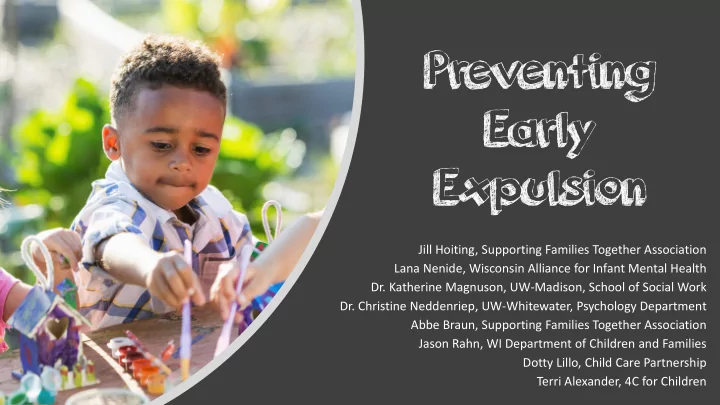

Jill Hoiting, Supporting Families Together Association Lana Nenide, Wisconsin Alliance for Infant Mental Health Dr. Katherine Magnuson, UW-Madison, School of Social Work Dr. Christine Neddenriep, UW-Whitewater, Psychology Department Abbe Braun, Supporting Families Together Association Jason Rahn, WI Department of Children and Families Dotty Lillo, Child Care Partnership Terri Alexander, 4C for Children
• Early expulsion occurs when a child and family is asked or made to leave an early education setting for reasons other than inability to pay for services • Early expulsion occurs among children zero to five • Early expulsion perpetuates challenging behaviors which can lead to many negative outcomes over time • Early expulsion impacts some groups of children more than others: • African American children • Boys • Children of families enrolled in WI Shares • Children with special needs
1 2 3 4 Systems Change Capacity Building Innovation Health Equity Transform how the field of Increase understanding, Adapt and implement a Reduce overall expulsion early education skills, and abilities of successful existing model and eliminate disparities approaches challenging families and early to reduce expulsion in in expulsion rates for behaviors through educators to support early childhood and children 0-5 years increased supports and optimal development of improve young children’s skills and develop a new children 0-5 years and social emotional skills state-level policy that is drive policy for the field of well-informed and funded early education to support statewide implementation
Demonstrated results in Readiness for change at early Strong relationships within Arkansas educator and policy levels existing systems and collaborations Community-based organizations Access to national and peer Representation of Wisconsin’s that are trusted brokers and expertise geographic diversity providers of services
About Expulsion About Change • Expulsion involves a triad: • Coaching and IMHC develop skills in adults and children, raise awareness • the child of implicit bias, and positively impact • the family interactions and environments • the early educator • Changes in skills, awareness, • Expulsion is the result of an adult’s interactions and environments result response to a child’s behavior and in adults responding differently to a the decisions that an adult makes child’s behaviors and making different decisions accordingly • A different decision means young children are not expelled
Planning and Sustainability Implementation Preparation • Disseminate findings to • Triage needs, key decision-makers determining whether • Adapt and refine and key stakeholders, onsite coaching or Arkansas’ model using including the infant mental health initial and ongoing Governor’s Early consultation will be family and early Childhood Advisory provided educator input Council and the WI • Onsite coaching using • Train teams at Department of Children the Pyramid Model of community-based and Families’ Expulsion Social Emotional organizations in the Workgroup Competence strategies adapted model • Evaluate funding • Provide Infant Mental • Solidify commitments approaches utilized, Health Consultation from early educators to including Child Care (IMHC) with supported not expel a child Development Block family engagement without accessing Grant, Medicaid and supports through the private health insurance model
Triage Helpline Onsite Infant Coaching Mental Health Consultation
Data will be used to see if the program is having the desired outcomes Data will be used during implementation for • Case specific information about whether the child remained in continuous improvement the program • The adaptation of the model will be informed • Third administration of statewide survey on use of expulsion by input from families and early educators (with oversampling in project regions) facilitated through Child Care Resource & • Family and early educator “exit” surveys about their Referral experiences with triage, onsite coaching and IMHC • By tracking case data in a comprehensive • Early educators will be asked about their knowledge of their data management system, the evaluation will implicit biases know who is using the triage system, what • IMH Consultant will complete a standardized assessment of services are being received, and whether the the child’s behavior when services start and when they are program is having the scope, reach and completed (BASC-3 BESS) “usability” that is expected • Coaches and IMH Consultants will observe the classroom • By conducting focus groups, we will know using a standardized tool that captures behavior management how families and early educators experience practices when services start and when they are completed the triage, onsite coaching, and IMHC, and (TPOT) whether they report changes in their • Reports will be disseminated to policymakers and key behaviors as a result stakeholders and the model is supported in a sustainable way
Early expulsion is an issue that perpetuates challenging behaviors and can lead to negative outcomes for young children, especially African American boys. Adapting the effective model utilized in Arkansas allows us to be responsive to the readiness for change in practice among early educators and the readiness for change in policy at the state level. Implementing the model to provide customized and tiered supports for early educators, families and young children, we will increase skills and strategies among early educators, families and children. Increasing the capacity of early educators, families and children will reduce expulsion rates and their associated disparities.
WITH YOUNG CHILDREN BEING WE ARE TAKING RESEARCH THE TIME IS RIGHT. EARLY EDUCATORS ARE EXPELLED AT DISPARATE RATES AND APPLYING IT IN READY FOR A SOLUTION AND THE STATE OF IN WISCONSIN, IF WE DO NOT WISCONSIN COMMUNITIES AT WISCONSIN IS COMMITTED TO CREATING AN MAKE A CHANGE, WE WILL THE MOST IMPACTFUL TIME EXPULSION POLICY. THIS WORK PRESENTS THE FACE INCREASED CHALLENGES OF A CHILD’S DEVELOPMENT. OPPORTUNITY TO DRIVE PRACTICE AND IN ACHIEVING HEALTH EQUITY. POLICY IN THE RIGHT DIRECTION.
Recommend
More recommend